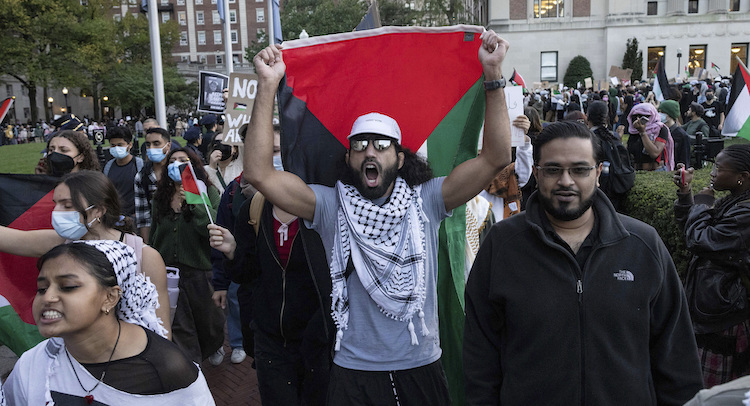Columbia University is close to reaching a deal with the Trump administration to once again be eligible for federal funds, the Wall Street Journal reports. It would be a significant milestone if the deal comes together by the end-of-Thursday deadline the administration gave Columbia last week.
The conditions of the deal are stern but reasonable, and they reflect the fact that Columbia has been uniquely beset by its inability to get its rampant anti-Semitism under control. That’s a key point here that usually goes ignored by the school’s defenders in academia.
In fact, while the prevailing narrative is that Trump is seeking to “make an example” out of Columbia, singling out the university for a sort of political hazing, the opposite is probably true: Columbia, as an institution, genuinely is in worse shape than anyone would have believed prior to the tentifada protests that broke out in support of Hamas after the latter’s Oct. 7, 2023 attacks. In that sense, the psychotic break the school has been having for 16 months is akin to an addict having to hit rock bottom before getting clean.
A good example—and one that probably has something to do with Columbia’s sudden cooperative tone—is the story that came out this week in the New York Post about the abuse faced by school janitors. As I wrote last week, one janitor on duty during last spring’s infamous Hamilton Hall occupation by pro-Hamas forces filed a report outlining how he was “assaulted and battered, and wrongfully imprisoned” by anti-Zionist activists. Now it turns out he and another janitor have filed a civil-rights claim over the alleged harassment they faced in retaliation for “reporting antisemitic and racist conduct.”
According to the complaint, soon after the Hamas attacks in 2023, students started drawing swastikas on the walls of buildings that Lester Wilson and Mario Torres worked in. They were ordered to simply scrub the swastikas and otherwise do nothing. “No matter how many times Mr. Wilson removed the swastikas, individuals kept replacing them with more,” the complaint alleges.
One of the janitors started removing chalk from the rooms after-hours so the swastikas would stop appearing, but was reprimanded by the school for doing so. When protesters ran through the building drawing anti-Semitic symbols, the janitors were told that “the trespassers and vandals were exercising their First Amendment rights.”
When the tentifada encampments began springing up around campus, the janitors were offered overtime to clean up around the camps. When another janitor did so, he was taunted as a “Jew-lover” by the students he was cleaning up after.
It turns out, then, that Columbia had something of a Nazi problem on campus. They were privileged kids in masks, but functionally Nazis nonetheless, obsessed with Nazi symbolism and Nazi language. Their violence toward the building workers only increased over time, as did their anti-Semitic harassment of Jews on campus.
This is what makes Columbia so unsympathetic. If Trump were merely trying to make an example of them, it could be easily demonstrated by showing that Columbia’s disorder was representative of the situation at universities across the country. But is it really the case that the Nazified atmosphere at Columbia is par for the course in American higher education? I don’t think academics at other schools really want to make this argument.
And thus we have the real reason for the administration’s treatment of Columbia: The “elite” institution deserved it.
Meanwhile, the case has raised another problem, this one much more widespread than the Nazi stuff. Columbia doesn’t want to comply with the government’s conditions, but according to the Journal there’s an emerging consensus that “the school has limited options because it relies on federal money.”
No one is forcing these schools to gorge themselves on public money. But with that reliance comes certain obligations.
The current crisis, then, provides an opportunity for schools to reconsider this model of higher education. They really can gain the kind of independence they crave, but that comes at a steep cost. Either way, it is not the Jewish students or the building workers like Wilson and Torres who put them in this position, and university administrators should stop making excuses and looking for scapegoats.


















